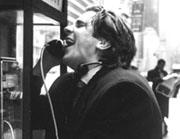|
No Jacket Required
By Joshua Rothkopf
American
Psycho
Directed by Mary Harron
When a book is described as "unfilmable," that's usually face-saving code for "unscreenable" (or "unwatchable"). Moviemakers like to be the self-appointed vulgarians - to spice up the Bard, say, or to bring consumable surface or sex to something previously headbound.
 |
|
Life's a scream. Credit: Kerry Hayes |
But when a novel comes along, like Bret Easton Ellis' American Psycho did in 1991, staking a claim to the same salacious territory that the movies would mark off as their own, it becomes a game of catch-up, a fake show of deference to the written word. Ellis' manuscript, which barely got published after first being dropped by Simon & Schuster, debuted to the kind of controversy that film publicists covet; sounds of lip-smacking were discernible in the din of cries of misogyny, racism, pornography. The book still reads like some kind of stunt, proving it was possible to turn out page after page armed only with the latest Zagat dining guide and a stack of designer catalogs.
This was exactly the point though: Patrick Bateman, Ellis' every-Yuppie narrator, dwells obsessively on his travelings - from elaborate squid appetizer to high-priced boutique to exclusive health club - and we're meant to be lulled by the details and name-dropping until Ellis can safely broadside us with something unbearably brutal. (Bateman is, in fact, a cannibalistic serial killer, although when and why that transformation occurs is not the author's concern.) The acute tortures of fashion, corporate one-upmanship and status flaunting found their extension in tortures of the body; defenders insisted the savagery was essential. But Ellis' satire approached a blunt pun on conspicuous consumption; he was received as more the provocateur than decrier of a decade's callousness.
With this in mind, the film version of American Psycho may be the best thing that ever could have happened to it. It has been picked up by Mary Harron, a director with feminist credentials (I Shot Andy Warhol); she and co-writer Guinevere Turner have sharpened the material into the pitch-black satire of male entitlement Ellis was likely intimating, while side-stepping much of the butchery he couldn't help but italicize. This may be disappointing news to those who (correctly) link the book's notoriety to its explicitness; Harron, it must be said, has not made a controversial film, but she has made a provocative one, a viciously funny American Psycho that, like Kubrick's Lolita, reveals more while showing less. It took shrewdness to realize the most detachable parts of the story were its extremities; what remains is something very sleek, hilariously poreless and certainly not nice.
![]()
|
In These Times ©
2000
Vol. 24, No. 12 |
